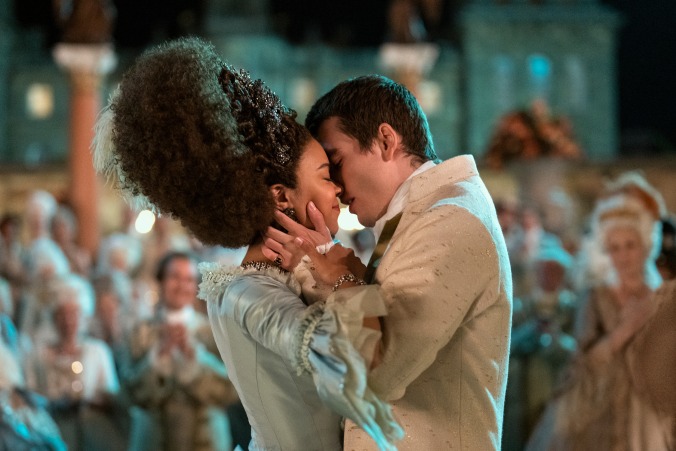Queen Charlotte: A Bridgerton Story review: So much to say, so little time
Netflix's Bridgerton spinoff has the breezy, sexy fun we expected, but is wildly overstuffed

Queen Charlotte: A Bridgerton Story, which premieres May 4 on Netflix, faces a daunting challenge over its six-episode run. This new offering serves not only as an origin story for the delightfully imperious Queen Charlotte (Golda Rosheuvel) of Bridgerton but also as an origin story for that flagship show’s colorblind alternate universe of Regency England. That’s a tall order and one the miniseries can’t fulfill, despite its charms.
Chief among those charms is the cast, which includes the highly capable India Amarteifio as a believable younger version of Rosheuvel’s Charlotte. She’s a headstrong young woman married off against her will to the King of England, George III, played by Corey Mylchreest, who bears an unfortunate resemblance to Nicholas Hoult on The Great (unfortunate for him, because The Great is a much better show). Nevertheless, Mylchreest shines when he turns on the charm, and the series is at its absolute best when the two leads are bickering, bantering, and earning their Bridgerton bonafides (read: getting it on).
But Queen Charlotte has a larger scope than its compelling central love story and not much time to stuff everything in. There’s a Downton Abbey–esque servants’ subplot (chiefly Sam Clemmett and Freddie Dennis, playing the king’s and queen’s right hands), though if there was a Bechdel test for servants talking about things other than the people they serve, Queen Charlotte would fail miserably. Then there’s the young Lady Agatha Danbury (Arsema Thomas) scrabbling for status in a hostile society while enduring an absolutely dreadful overuse of her noggin hitting the headboard to demonstrate her loveless marriage to an awful older man (Cyril Nri). Game Of Thrones’ Michelle Fairley is entirely wasted in her own fruitless storyline of plotting against and around her son; she’s ostensibly powerful but not actually doing much at all besides introducing Charlotte to us.
Meanwhile, in Bridgerton’s “present,” older Charlotte, older Agatha (Adjoa Andoh), and older Violet Bridgerton (Ruth Gemmell) have their own plots that feel largely extraneous to the series. Occasionally, the parallels between younger and older Charlotte can be poignant, though the juxtaposition sometimes makes older Charlotte unlikable. And Agatha and Violet’s subplot seems tacked on to justify those actors’ presence in the series; ultimately they feel unnecessary and unresolved.
Finally, there are the social issues at play. The exploration of mental illness within the constraints of the time period serves as a momentous obstacle for the young couple. At times, though, this results in the world’s most powerful person essentially oppressing himself, which is frustrating to watch. And the matter of racism in this not-quite-historically-accurate world is tricky business. England is integrated by complete accident, and bigotry is combated by throwing balls. (“With one evening, one party, we have created more change, stepped forward more than Britain has in the last century!” says the literal ruler of a vast empire after attending a soirée.)
Yet Queen Charlotte stays vague about the particulars of how this society has evolved, describing the schism in facile terms of “our side” and “their side” to refer to white people and people of color without ever really explaining how these “sides” became thus entrenched. It’s a noble aim, but reconstructing a new, different version of historical intolerance is rather messy. Which is all to say: Bridgerton’s policy of not explaining its diversity was easier to swallow.
Despite these criticisms, Queen Charlotte is not unenjoyable to watch. Shonda Rhimes is the primary writer, and the show has all the things that make a Shonda Rhimes production pleasurable to watch, including strong, complex, outspoken female leads; rousing monologues; swoon-worthy romance; and a healthy dose of drama.
But it seems beyond even Rhimes’ considerable powers to juggle so many threads in such a short episode order (especially when one of those episodes rewinds to the beginning and plays the whole thing out again, but from a different perspective). This series wants to be many things: a rumination on different forms of widowhood and sexuality for older women, a drama about balancing duty with passion, an exploration of social issues through a semi-historical lens, and a coming-of-age and coming-to-power tale for young women raised in a society that would reject them. There may be a version of this show that can do it all, but not in just six episodes. (NB: The streamers’ preference for abbreviated seasons is one of the issues at stake in the Writers Guild of America strike.) Bridgerton fans will likely find Queen Charlotte breezy, sexy fun, but any attempt to go deeper sadly comes up short.
Queen Charlotte: A Bridgerton Story premieres May 4 on Netflix